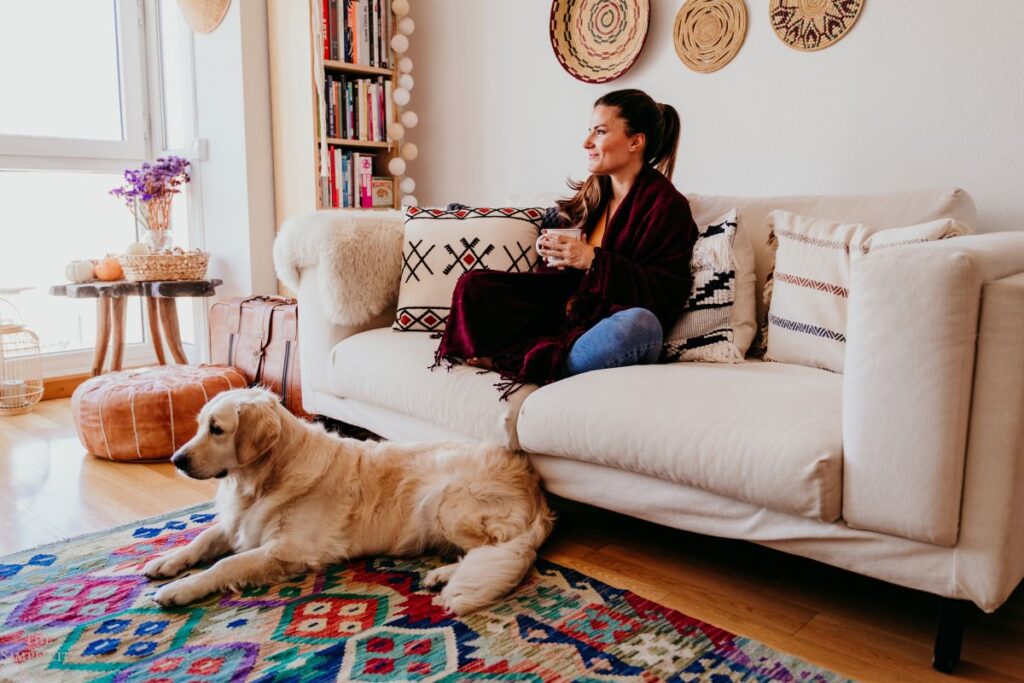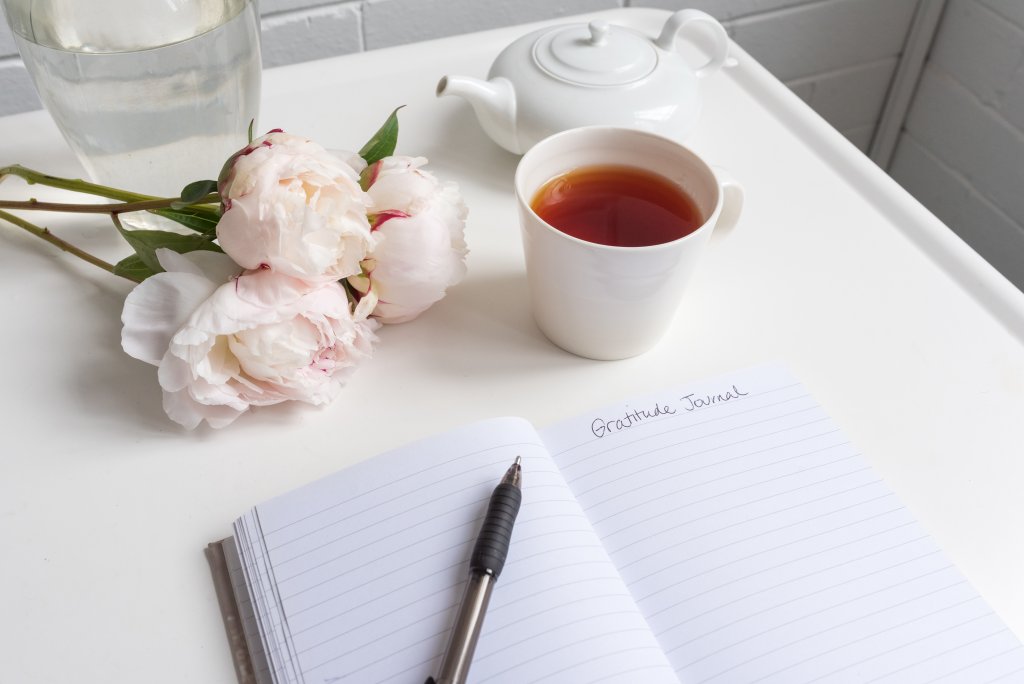Inside: Use these journal prompts for anxiety to help you manage and overcome your fears.
If you live with anxiety, you know it’s absolutely no fun.
It’s an ever-present struggle you have to overcome every day. It can overwhelm your thoughts, your feelings, your emotions. And it can be difficult to manage – to put it lightly.
But there’s something you can do to keep anxiety at bay… and all it costs is a pen or pencil, some paper, and a few minutes out of your day.
If you aren’t already journaling to manage your anxiety and overcome your fears, let me introduce you to a tool that’ll help you keep that anxiety under control.
And if you are journaling for anxiety today? Keep reading to find some anxiety prompts that’ll help you navigate your mental state.

How Can Journaling Help You Manage Your Anxiety?
The connection between journaling and anxiety may not be immediately clear, but believe me – writing every day can really benefit you and your ability to keep anxious thoughts and feelings at bay.
There’s something incredibly powerful about getting your thoughts out of your mind and out into the wild. The simple act of writing down your emotions and feelings can bring a great sense of clarity and help you find the perspective that you may lack when ruminating on the thoughts in your head.
Journaling can improve your well-being and increase your focus. It’s a healthy and helpful habit to develop in your life.
Writing down those thoughts allows you to step back and consider them objectively. It gives you an opportunity to rationalize them – to dig a little deeper and understand where they’re coming from. And once you know where they’re coming from, or what’s causing them, you can actively take steps to eliminate that trigger or better manage your response to it.
Journaling has been proven to reduce stress, calm anxiety, boost creativity, and create a more positive outlook in life. And unlike most hobbies, it doesn’t cost much money or require many tools to get started. With such a low barrier to entry, there’s no reason not to give it a shot.
All you need is a pen, some paper, and if you need a little inspiration, some journal prompts for anxiety.

Journal Prompts for Anxiety
You want to give journaling a shot – but you don’t quite know where to start.
What do you write? How do you know what to say first?
If you aren’t already in the practice of journaling, it can be harder than you think to put pen to paper and actually start writing.
That’s where journaling prompts can be a huge help. By giving you something to react to or work from, you have a jumping-off point for your thoughts.
The following journal prompts for anxiety are designed to give you exactly that – a place to focus your thoughts, a starting point.
1. What scares you – and why?
Journaling can be a great way to face your fears and a tool to help you overcome them. This journal prompt for anxiety asks you to look inward and name the things that make your heart race and your palms sweat.
Whether you’re scared of public speaking, parallel parking, trying new foods, or something more dramatic, by writing it down, you’re encouraged to explore those anxiety inducers as you’ve never done before – and in doing so, you may come to realize they aren’t as scary as you originally thought.
And even if they remain something that creates anxiety, you can become better equipped to manage those feelings. By identifying your fears and naming them on paper, you can bring them to light to process them rather than allowing them to continue to ruminate in your thoughts.

2. When was the last time you failed?
For many, the thought of failure is an instant anxiety trigger. Failing at work, failing in our relationships, failing ourselves… the idea of causing disappointment isn’t easy to stomach.
Unfortunately, failure is something that all of us experience in our lives – more than just once.
So it’s a good idea to get a little more comfortable with the idea of failure. And journaling about it can be a great way to do it.
By documenting the last time you really failed at something, you can step back and examine the situation without all of the emotions that initially surrounded it.
And while you might still be disappointed that things happened the way they did, you’ll be able to see that it wasn’t a world-ending mistake. Life goes on.
And the next time you fail at something, the same thing will happen. Understanding this can help you keep anxiety at bay when you don’t quite hit the mark.
Starting a written record of how you’ve overcome challenges, obstacles, and failures can be an encouragement and a reminder that these moments are temporary. By being able to step outside your current circumstances and shift your perspective to the bigger picture, you can help decrease your level of anxiety.

3. What would happen if I _________?
For many of us who struggle with anxiety, the unknown is a big source of stress. When you don’t know exactly what will happen, and there are some potentially negative outcomes out there, it’s easy to get stuck in an anxious state, worrying about how things are going to end up.
Whenever this happens, journaling can be an incredibly powerful tool to bring an end to that anxious spiral.
Grab a pen and some paper, and write down all of the possible scenarios. Think them through and jot them down – or type them into your phone’s note-taking app, if you must.
What would happen if you made that phone call? Or what would happen if you interviewed for a new job?
What would happen if you ended that relationship? Or what would happen if you moved to a new city where you didn’t know anyone and started over?
By literally laying your options out in front of you, you’ll often find that most of them will likely unfold better than you think, or at worst not have as bad of an outcome as you may imagine. You just have to give yourself a chance to step outside your feelings to gain that perspective.

4. What are you looking forward to?
It’s easy to focus on all of the negative things in our lives and totally overlook the positives.
Unfortunately, when you’re dealing with anxiety, looking forward to things in the future can feel like an impossible challenge.
That’s why this journaling prompt is so great. By forcing yourself to step back and think about what you’re looking forward to, and writing those thoughts down, you prove to yourself that there’s plenty to get excited about and look forward to.
This positive shift can uplift your mood and brighten your day – and help keep anxiety under control.
Instead of getting caught up in the moment, this prompt encourages you to focus on what excites and energizes you. Whether that’s something big, like your next international vacation, or something small, like a warm cup of your favorite tea after work, the benefit is the same.
Another way to think ahead is to use future self-journaling to try and get outside your current circumstances so that you can see the big picture more clearly.
Often the simple act of imagining yourself in the future in a positive light can make the current circumstances feel more fleeting and temporary.

5. How do I feel at this moment?
Are you feeling anxious? Worried? Totally overwhelmed?
By simply putting pen to paper and getting those feelings out, you might be surprised to find your anxious thoughts are a lot more manageable.
Stream-of-consciousness writing can be an excellent way to release stress, relieve anxiety, and bring yourself a little peace and clarity. Sometimes, you don’t even know what you’re thinking or how you truly feel about something until you let it all out, step back, and take a moment to reflect.
Being honest with yourself and writing down those thoughts and feelings is a grounding practice that can help shed more light on your current situation. In that process, it’s helpful to identify what things or people may be adding to your anxiety.
That isn’t to say you could or should necessarily avoid those things because some things that cause anxiousness are part of helping us learn, grow, and live a healthy lifestyle. And by avoiding those things you may cause your anxiety to continue to increase until you finally face them.
For instance, if you loathe going to see the dentist because it makes you feel nervous, the solution is not to avoid going. By avoiding that behavior you’d increase the likelihood of developing problems with your teeth while also increasing your level of anxiousness.
However, in other situations avoiding things that cause you greater anxiety can be helpful. If you know that talking to a certain friend or relative is going to make you feel worse, not better then you may want to find someone more supportive to discuss it with.
If you notice certain habits or behaviors, such as overscheduling your life or drinking caffeine, cause you to feel more anxious then avoiding it or at least decreasing it would be a good decision.

6. What things help me to feel more calm?
This is one of the most important journal prompts for anxiety as it helps you focus on positive solutions to help ease your anxiousness.
What types of activities help you to feel more calm? Some ideas are deep breathing, meditation, prayer, walking outside, or taking a nap. The calm app can be a helpful resource. There are no right or wrong answers here.
Ask yourself: What has helped in the past? What have I been lacking recently?
Knowing what coping mechanisms work best for you is a great way to help regain balance and decrease your levels of anxiety.
Consider the influence that your environment has on your mood as well. If your home is chaotic, it’s hard to feel peaceful when you’re in it. Look for ways to make your home feel more calm.
Part of becoming more self-aware and getting in touch with what your needs are is also acknowledging where you’re at and knowing when you need to seek further help from a professional.
Sometimes you may feel like you can manage the anxiety on your own, but there are other times when you need some extra help. And there is nothing wrong with that. Focus on getting the care that is right for your circumstances and needs.

7. What am I grateful for?
The last of the journal prompts for anxiety is to reflect on the things that you’re grateful for.
Research has shown that gratitude can help reduce anxiety. By focusing on the things you’re thankful for you can help create more calm and peace in your mind.
If you’re not sure how to get started, you can use these gratitude prompts as a jumping-off point. The things you’re grateful for don’t have to all be deep either. You can often find a lot of small things that bring a smile to your face when you intentionally look for them.
Noticing the simple joys in life can ease feelings of anxiousness and bring a greater sense of happiness to your day.
Challenge yourself to look for them this week and see how it changes your perspective.
Which journal prompts for anxiety resonate with you the most? Leave a comment and let me know!
Sign up on the form below to get weekly simplifying and intentional living inspiration sent straight to your inbox. You’ll also receive the free Priorities Assessment Worksheet to help you declutter your schedule and focus on what matters most!


I’m trying to understand the statement “Think them through and jot them down – or type them into your phone’s note-taking app, if you must.” in prompt number 3. Are there benefits to writing longhand vs. typing, or is the phone a less effective vessel than the paper notebook?
Great question, John. Yes, I do believe there are benefits to writing by hand vs typing. This post does a good job explaining some of the differences: https://lifehacker.com/journaling-showdown-writing-vs-typing-1792942629
Great article! What is a “ground practice” in #5? It says: Being honest with yourself and writing down those thoughts and feelings is a ground practice that can help shed more light on your current situation.
Thanks, Vicki. It should have said ‘grounding’. I’ve fixed it now. Thank you!
I have enjoyed reading the article,it has really opened up my mind,all my worries and anxieties have vanished. The simplicity habit it the way to go. I will keep on following your page. Keep up the good work.